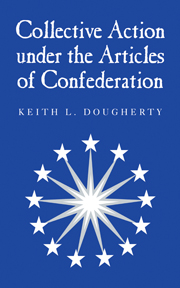Book contents
- Frontmatter
- Contents
- List of Tables and Figures
- Acknowledgments
- 1 The Mystery of State Contribution
- 2 National Interests and State Sovereignty: Objectives of the Confederation
- 3 Collective Action and the Provision of Public Goods
- 4 The History of State Compliance
- 5 State Contributions and Private Interests
- 6 Reacting to Rebellion
- 7 A New Constitution
- 8 Conclusion
- Appendix: Olson's Collective Action Game
- Glossary
- References
- Index
7 - A New Constitution
Published online by Cambridge University Press: 15 October 2009
- Frontmatter
- Contents
- List of Tables and Figures
- Acknowledgments
- 1 The Mystery of State Contribution
- 2 National Interests and State Sovereignty: Objectives of the Confederation
- 3 Collective Action and the Provision of Public Goods
- 4 The History of State Compliance
- 5 State Contributions and Private Interests
- 6 Reacting to Rebellion
- 7 A New Constitution
- 8 Conclusion
- Appendix: Olson's Collective Action Game
- Glossary
- References
- Index
Summary
[T]he difficulty certainly is, how to give this power in such manner as that it may only be used to good, and not abused to bad purposes. Whoever shall solve this difficulty will receive the thanks of this and future generations.
–Richard Henry LeeIf revenues would have permitted it, some members of Congress would have voted to maintain a small standing army in the summer of 1787, rather than to repeal the special requisition outright. Crises like Shays' Rebellion could occur again, particularly with American settlers moving westward into Indian territory. With a small standing army, the federal government could demonstrate its energy and react more effectively to military necessities. But without the perpetual consent of nine state delegations or a means of financing a force, the federal government could not defend the West.
The Nationalists used the nation's poor response to Shays' Rebellion to illustrate the defects of the union and to push for institutional reform. They observed that states withheld requisitions according to the particulars of each request and realized that requisitions in their original form would work only partially. Reliance on requisitions prevented Congress from raising the men and money it needed to provide public goods for the states. By the summer of 1787, the federal government had no funds to protect American shipping from the Barbary states, it could not dislodge the British from their garrisons along the Canadian border, and it could not breach the Spanish blockade of the Mississippi – let alone suppress a domestic insurrection. Each problem affected the United States and threatened its interests.
- Type
- Chapter
- Information
- Collective Action under the Articles of Confederation , pp. 129 - 161Publisher: Cambridge University PressPrint publication year: 2000

